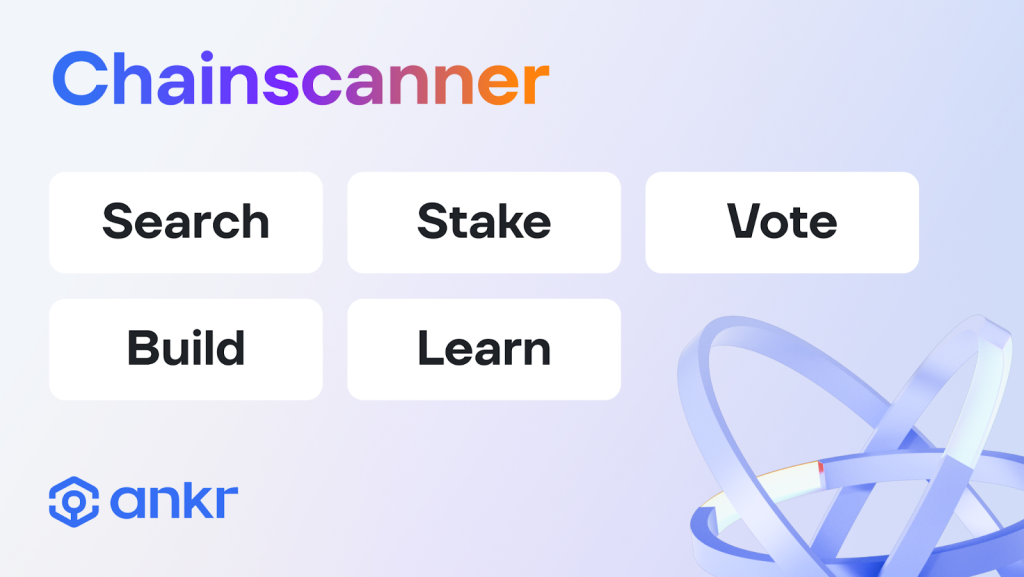
Ankr, one of the world’s leading providers of Web3 infrastructure, has now announced the launch of Chainscanner, an all-in-one block explorer and analytics platform designed specifically for application-specific blockchains (AppChains). It makes it simple for users as well as developers to examine and analyze data and interact with the chains of their choice. The newly-launched Chainscanner is advantageous to both users and developers.
It provides an intuitive user interface that takes care of all requirements for engaging with AppChains that are deployed on sidechain ecosystems such as BNB, Polygon, and Avalanche. When it comes to seeing on-chain data and transactions, developers no longer have to construct block explorers or any other necessary blockchain infrastructure from scratch or make use of the solutions that are already available, which may be rather expensive.

Kev Silk, Product Manager for Ankr AppChains, said, “Chainscanner is an essential new building block for AppChains that greatly improves user experience with tools made to let users instantly search for data, stake tokens, vote on governance proposals, get development resources, apply to become a validator, and learn everything about different chains. This is how we make decentralized apps as easy to use and as high performance as the centralized apps we’re used to interacting with every day.”
An End-To-End Engineering Solution For Web3 Developers
Ankr provides AppChains-as-a-Service, an end-to-end engineering solution that makes it simple for Web3 application developers to construct bespoke blockchains that are optimally suited to the specific needs of their applications. Poor transaction speed and high gas fees are two of the most significant obstacles preventing the widespread adoption of Web3 technology. Empowering developers to create their own blockchains on Sidechain frameworks such as Polygon Edge, Avalanche Subnets, and the BNB Chain’s BAS helps alleviate these problems.
Using AppChains gives developers the flexibility to pick and choose the programming languages, consensus algorithms, and development frameworks that they choose to employ in their projects. They are able to fine-tune the security of their decentralized application (dApp) without having to rely on complicated smart contracts and asset bridges. Developers and users are able to view transparent statistics and stats for validators, unique users, token information, token holders, and a great deal more with the help of Chainscanner.
They also have the ability to stake tokens in order to support the AppChain of their choosing and take part in the governance of AppChain. Chainscanner facilitates user participation in governance, stake, and development. In addition, Chainscanner provides developers with data regarding the performance of their chain in comparison to the performance of other chains already available on the market, as well as the supply and demand for staking.

Users, on the other hand, have the ability to collect data on the staking usage of a specific chain or token in order to have an understanding of the amount of traction that a Web3 app is getting. Ankr believes that in order to make Web3 accessible to a wider audience, it is essential to simplify the process of blockchain creation while still maintaining scalability and app-specific customization.
The Future Of Decentralized Web3 Infrastructure
By supporting over 50 proof-of-stake chains with a market-leading global node delivery system and RPC aggregator, Ankr is creating the decentralized Web3 infrastructure of the future. As of 2022, Ankr is the biggest infrastructure provider for BSC, Fantom, and Polygon chains, now serving more than 2 trillion transactions annually throughout Web3. The Liquid Staking SDK, Web3 Gaming SDK, and AppChains As a Service are just a few of the developer tools that Ankr provides to help dApp developers create Web3 apps fast and easily.
Ankr plans to build both a marketplace and an infrastructure platform in order to support the implementation of Web3 stacks. As a result, end-users and resource suppliers are given the ability to connect to dApps and blockchain technology. It is important to keep in mind that the Ankr cloud infrastructure is not shared with any other customers and functions independently in comparison to the infrastructure of other public cloud providers. In order to improve its level of resilience and stability, it is powered by data centers that are located in a variety of geographic locations.
Ankr has the capability to present enterprise clients and developers with the possibility of establishing more than one hundred different kinds of blockchain nodes. Decentralized infrastructure, node deployment with a single click, and automated management through the utilization of cloud-native technologies and Kubernetes are some of the essential components. Ankr leverages clever connectivity and has a quirky, unique selling factor. Anyone is capable of constructing a blockchain, making use of the technology, putting together a development team, and taking the lead.









